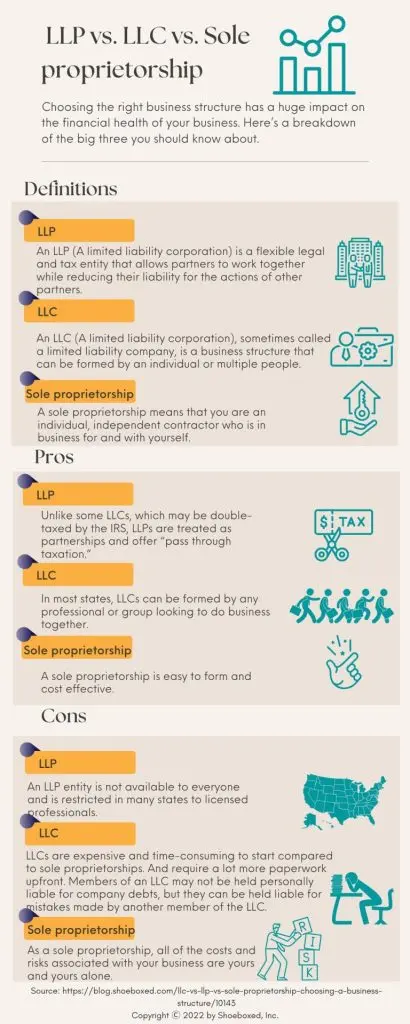Choosing the right business structure will have a huge impact on the financial health of your business.
While the wrong structure could leave you vulnerable to lawsuits or leave you with a large tax debt—the right structure will protect your assets and ensure steady growth.
For small business owners, the choice between Sole Proprietorship vs. LLC (limited liability company) vs. LLP (limited liability partnership) can be confusing at best.
To help you out, we will compare LLC and LLP, the benefits of LLC vs sole proprietorship, the difference between LLC vs LLP, how each type can affect your tax liability, how each affects your personal liability, and the pros and cons of each type.
Sole proprietorship
What is a sole proprietorship?
A sole proprietorship means that you are an individual, independent contractor who is in business for and with yourself; the terminology “solopreneur” perfectly embodies this type of business entity. Sole proprietorships are the most popular business structure in the United States.
See also: Bookkeeping for Startups: Best Practices, Steps, FAQs
What are the advantages of a sole proprietorship?
A sole proprietorship is a straightforward and cost-effective business structure that applies to both business then and now. It allows you to quickly establish your business and start operating with minimal requirements. All you need is the core elements of any business—your product or service, customers, and determination.
When your first customer makes that first purchase, a sole proprietorship is born. As long as you have all the required certifications and licenses for your particular industry, you don’t even have to make any special tax considerations for your business until it’s time to file.
What are the disadvantages of a sole proprietorship?
A sole proprietorship puts your personal liability most at risk. All of the costs and risks associated with your business are yours, and yours alone.
Since you and your business are one entity, you are personally liable for any and all business debts or legal action brought against your company, and your personal assets—such as your car, house, and bank accounts—are at risk
Navi Maraj, a certified CPA explains in details the legal and tax differences between Sole Proprietor vs. LLC vs. S Corporation vs. C Corporation. Watch the video for more helpful information!
Hierarchy organization
LLC: Limited liability corporation
What is a LLC?
A Limited Liability Corporation (sometimes called a LLC) is a business entity that can be formed by an individual or multiple people. Unlike a sole proprietorship, an LLC differentiates between the individual and the business, offering personal liability protection from business liabilities.
When setting up an LLC, it’s important to choose the right address that aligns with your business requirements. Learn more about the address options for your LLC in our article on Address Can I Use for My LLC.
What are the advantages of a LLC?
In most states, LLCs can be formed by any professional or group looking to do business together. This means you can work with other people and pool your resources to start a business.
Under an LLC, your personal assets, such as your savings and your house, are usually protected if the company is sued. It may also be easier for startups to raise capital as an LLC.
See also: Bookkeeping for LLC: Best Practices and FAQs
What are the disadvantages of a LLC?
When comparing LLC versus sole proprietorship here’s what to keep in mind: LLCs are expensive and time-consuming to start compared to sole proprietorships. Initially, the difference between sole proprietorship and LLC is that an LLC will require a lot more paperwork upfront.
Another point to consider in the LLC versus sole proprietor debate: Members of an LLC may not be held personally liable for a limited liability company’s debts, but they can be held liable for mistakes made by another member of the limited liability company. Therefore, an LLC does offer some liability protection, but only to a certain degree.
For instance, if one business owner defaults on a loan made to the LLC, all parties can be held responsible. Also, if an LLC is formed as an S or C corporation, it can be taxed twice on the same profits by the IRS. This is known as double taxation.
How to pay yourself from an LLC
When you run an LLC (Limited Liability Company), getting paid is not straightforward compared to if you own a sole proprietorship. Additionally, you’ll need to earn a significant wage if you work for your business.
Follow these simple steps below to get paid and ensure you obey all IRS requirements for tax filing.
Step 1. Determine the status of your business—a sole proprietorship, partnership, or corporation.
Your LLC can file taxes as a business entity, which can help you save on tax payments. The IRS will consider it a sole proprietorship, partnership, or corporation, depending on the format you choose when filing your taxes.
Step 2. Get paid by setting up an owner’s draw for your LLC.
To have an owner’s draw, first, write a check from your business account for the amount you are withdrawing from your business and then place this check in your bank account.
Secondly, document the withdrawal as a reduction in your owner’s equity account. Credits from the owner’s equity or capital account are given to you.
See also: Accounting for LLC: Best Practices, Steps, Resources, FAQs
Step 3. Make sure you pay the correct amount of taxes for your income.
As a sole proprietor, the IRS requests that you pay income tax on all business income, whether or not you ever use that money. Even if you don’t take your profits (money you make from your business), you still have to pay income taxes.
You also have to pay taxes on your income from self-employment. When you work for someone else, your employer pays part of your Social Security and Medicare contributions. When you’re self-employed, you still have to pay your share of these taxes. The self-employment tax rate is 15.3% of your income.
Check out this video on Self Employed TAXES Explained & Self Employed TAX TIPS (tax return documents & checklist) for more useful information on how to pay yourself from an LLC!
Turn receipts into data for tax time ✨
Try Shoeboxed’s systematic approach to receipt tracking for tax season. Try free for 30 days!
Get Started Today
LLP: Limited liability partnership
What is an LLP?
Now, let’s talk a little bit about a LLC vs LLP. A Limited Liability Partnership is similar to an LLC, but offers slightly different tax implications. In many states, LLPs can only be formed by licensed individuals like lawyers, architects, and doctors.
What are the advantages of an LLP?
Unlike some LLCs, which may be double-taxed by the IRS, LLPs are treated as partnerships and offer pass through taxation. This means that business partners in the LLP are only taxed once on their personal income taxes.
Another big advantage of forming an LLP is that business partners are protected from one another, in that they’re not liable for the other’s mistakes. If one partner behaves badly and the LLP gets sued, the other partner can’t be held personally responsible for their actions.
What are the disadvantages of an LLP?
This business entity is not available to everyone, and is restricted to licensed professionals only in many states. Other concerns include the following:
It’s not possible for an LLP to file taxes in an S corporation category.
Tax and business-related filing are more challenging than that of an LLC.
There must be a managing partner for an LLP. And other partners are required to assist in the business operations.
When considering business structures, you should take into consideration your industry, budget, personal assets, limited liability protection, and business goals. Consider consulting a tax professional to see which structure is the best bet for your business.
Can a husband and wife be partners in an LLP?
A husband and wife can act as LLP partners. However, a special tax liability operating agreement must be set up to reduce family tax liability. If spouses share in the profits and losses of their business, this is called being a partner. Even without a formal partnership agreement, their involvement in the business is still considered a partnership.
If they have income or loss from a business, the couple should report the loss on Form 1065 instead of Schedule C (Form 1040). On the other hand, the couple is not required to submit their joint business as a partnership by turning in a qualified joint venture election.
What should you know about LLP vs. LLC?
An LLP is a type of business organization that is made up of partnership owners, while an LLC is made up of individual members. One of the most crucial differences between limited liability companies (LLCs) and limited liability partnerships (LLPs) is how each organization is identified.
Limited liability gives the owners of an LLC personal liability protection for business debts. This means that, as long as the owners have contributed money to the business, they are not responsible for any financial losses that occur as a result of the business.
The owners of the LLC are also not personally liable for the negligence or misconduct of their co-owners. But LLC partners have to be responsible for their due diligence and behaviors.
Some states offer the same liability protection to LLCs as to LLP’s. In some states, partners are only liable for their own negligence, while in others they are fully responsible for business obligations. Some states request LLPs to assign a general partner who is entirely accountable for the LLC’s debts and obligations, while the other partners have limited liability.
Frequently asked questions
What should you know about LLP vs. LLC?
An LLP is a type of business organization that is made up of partnership owners, while an LLC is made up of individual members.
Which is better, a sole proprietorship or a partnership?
Your business framework will significantly determine how much you will need to invest in the business. A sole proprietorship is an option if you plan to be the sole owner. To establish a business partnership with someone else, you must set up your business under the LLP—as a partnership structure.
Can a husband and wife be partners in an LLP?
A husband and wife can act as LLP partners, but a special tax liability agreement must be set up to reduce family tax liability.
Bonus infographic on Sole Proprietorship vs. LLC vs. LLP

LP vs. LLC vs. Sole proprietorship Original Infographics.
You might like:
Whitepaper: Five Proven Methods to Reduce Small Business Taxes
How to Track Mileage for Tax Deductions with the Shoeboxed App
What to Keep Track of as an Independent Contractor: 7 Document Types
About Shoeboxed!
Shoeboxed is a receipt scanning service with receipt management software that supports multiple methods for receipt capture: send, scan, upload, forward, and more!
You can stuff your receipts into one of our Magic Envelopes (prepaid postage within the US). Use our receipt tracker + receipt scanner app (iPhone, iPad and Android) to snap a picture while on the go. Auto-import receipts from Gmail. Or forward a receipt to your designated Shoeboxed email address.
Turn your receipts into data and deductibles with our expense reports that include IRS-accepted receipt images.
Join over 1 million businesses scanning & organizing receipts, creating expense reports and more—with Shoeboxed.



